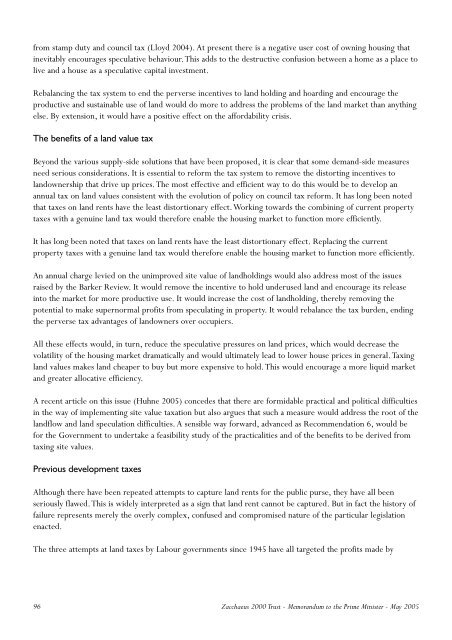Memorandum-to-the-Prime-Minister-on-Unaffordable-Housing
Memorandum-to-the-Prime-Minister-on-Unaffordable-Housing
Memorandum-to-the-Prime-Minister-on-Unaffordable-Housing
You also want an ePaper? Increase the reach of your titles
YUMPU automatically turns print PDFs into web optimized ePapers that Google loves.
from stamp duty and council tax (Lloyd 2004). At present <str<strong>on</strong>g>the</str<strong>on</strong>g>re is a negative user cost of owning housing that<br />
inevitably encourages speculative behaviour.This adds <str<strong>on</strong>g>to</str<strong>on</strong>g> <str<strong>on</strong>g>the</str<strong>on</strong>g> destructive c<strong>on</strong>fusi<strong>on</strong> between a home as a place <str<strong>on</strong>g>to</str<strong>on</strong>g><br />
live and a house as a speculative capital investment.<br />
Rebalancing <str<strong>on</strong>g>the</str<strong>on</strong>g> tax system <str<strong>on</strong>g>to</str<strong>on</strong>g> end <str<strong>on</strong>g>the</str<strong>on</strong>g> perverse incentives <str<strong>on</strong>g>to</str<strong>on</strong>g> land holding and hoarding and encourage <str<strong>on</strong>g>the</str<strong>on</strong>g><br />
productive and sustainable use of land would do more <str<strong>on</strong>g>to</str<strong>on</strong>g> address <str<strong>on</strong>g>the</str<strong>on</strong>g> problems of <str<strong>on</strong>g>the</str<strong>on</strong>g> land market than anything<br />
else. By extensi<strong>on</strong>, it would have a positive effect <strong>on</strong> <str<strong>on</strong>g>the</str<strong>on</strong>g> affordability crisis.<br />
The benefits of a land value tax<br />
Bey<strong>on</strong>d <str<strong>on</strong>g>the</str<strong>on</strong>g> various supply-side soluti<strong>on</strong>s that have been proposed, it is clear that some demand-side measures<br />
need serious c<strong>on</strong>siderati<strong>on</strong>s. It is essential <str<strong>on</strong>g>to</str<strong>on</strong>g> reform <str<strong>on</strong>g>the</str<strong>on</strong>g> tax system <str<strong>on</strong>g>to</str<strong>on</strong>g> remove <str<strong>on</strong>g>the</str<strong>on</strong>g> dis<str<strong>on</strong>g>to</str<strong>on</strong>g>rting incentives <str<strong>on</strong>g>to</str<strong>on</strong>g><br />
landownership that drive up prices.The most effective and efficient way <str<strong>on</strong>g>to</str<strong>on</strong>g> do this would be <str<strong>on</strong>g>to</str<strong>on</strong>g> develop an<br />
annual tax <strong>on</strong> land values c<strong>on</strong>sistent with <str<strong>on</strong>g>the</str<strong>on</strong>g> evoluti<strong>on</strong> of policy <strong>on</strong> council tax reform. It has l<strong>on</strong>g been noted<br />
that taxes <strong>on</strong> land rents have <str<strong>on</strong>g>the</str<strong>on</strong>g> least dis<str<strong>on</strong>g>to</str<strong>on</strong>g>rti<strong>on</strong>ary effect.Working <str<strong>on</strong>g>to</str<strong>on</strong>g>wards <str<strong>on</strong>g>the</str<strong>on</strong>g> combining of current property<br />
taxes with a genuine land tax would <str<strong>on</strong>g>the</str<strong>on</strong>g>refore enable <str<strong>on</strong>g>the</str<strong>on</strong>g> housing market <str<strong>on</strong>g>to</str<strong>on</strong>g> functi<strong>on</strong> more efficiently.<br />
It has l<strong>on</strong>g been noted that taxes <strong>on</strong> land rents have <str<strong>on</strong>g>the</str<strong>on</strong>g> least dis<str<strong>on</strong>g>to</str<strong>on</strong>g>rti<strong>on</strong>ary effect. Replacing <str<strong>on</strong>g>the</str<strong>on</strong>g> current<br />
property taxes with a genuine land tax would <str<strong>on</strong>g>the</str<strong>on</strong>g>refore enable <str<strong>on</strong>g>the</str<strong>on</strong>g> housing market <str<strong>on</strong>g>to</str<strong>on</strong>g> functi<strong>on</strong> more efficiently.<br />
An annual charge levied <strong>on</strong> <str<strong>on</strong>g>the</str<strong>on</strong>g> unimproved site value of landholdings would also address most of <str<strong>on</strong>g>the</str<strong>on</strong>g> issues<br />
raised by <str<strong>on</strong>g>the</str<strong>on</strong>g> Barker Review. It would remove <str<strong>on</strong>g>the</str<strong>on</strong>g> incentive <str<strong>on</strong>g>to</str<strong>on</strong>g> hold underused land and encourage its release<br />
in<str<strong>on</strong>g>to</str<strong>on</strong>g> <str<strong>on</strong>g>the</str<strong>on</strong>g> market for more productive use. It would increase <str<strong>on</strong>g>the</str<strong>on</strong>g> cost of landholding, <str<strong>on</strong>g>the</str<strong>on</strong>g>reby removing <str<strong>on</strong>g>the</str<strong>on</strong>g><br />
potential <str<strong>on</strong>g>to</str<strong>on</strong>g> make supernormal profits from speculating in property. It would rebalance <str<strong>on</strong>g>the</str<strong>on</strong>g> tax burden, ending<br />
<str<strong>on</strong>g>the</str<strong>on</strong>g> perverse tax advantages of landowners over occupiers.<br />
All <str<strong>on</strong>g>the</str<strong>on</strong>g>se effects would, in turn, reduce <str<strong>on</strong>g>the</str<strong>on</strong>g> speculative pressures <strong>on</strong> land prices, which would decrease <str<strong>on</strong>g>the</str<strong>on</strong>g><br />
volatility of <str<strong>on</strong>g>the</str<strong>on</strong>g> housing market dramatically and would ultimately lead <str<strong>on</strong>g>to</str<strong>on</strong>g> lower house prices in general.Taxing<br />
land values makes land cheaper <str<strong>on</strong>g>to</str<strong>on</strong>g> buy but more expensive <str<strong>on</strong>g>to</str<strong>on</strong>g> hold.This would encourage a more liquid market<br />
and greater allocative efficiency.<br />
A recent article <strong>on</strong> this issue (Huhne 2005) c<strong>on</strong>cedes that <str<strong>on</strong>g>the</str<strong>on</strong>g>re are formidable practical and political difficulties<br />
in <str<strong>on</strong>g>the</str<strong>on</strong>g> way of implementing site value taxati<strong>on</strong> but also argues that such a measure would address <str<strong>on</strong>g>the</str<strong>on</strong>g> root of <str<strong>on</strong>g>the</str<strong>on</strong>g><br />
landflow and land speculati<strong>on</strong> difficulties. A sensible way forward, advanced as Recommendati<strong>on</strong> 6, would be<br />
for <str<strong>on</strong>g>the</str<strong>on</strong>g> Government <str<strong>on</strong>g>to</str<strong>on</strong>g> undertake a feasibility study of <str<strong>on</strong>g>the</str<strong>on</strong>g> practicalities and of <str<strong>on</strong>g>the</str<strong>on</strong>g> benefits <str<strong>on</strong>g>to</str<strong>on</strong>g> be derived from<br />
taxing site values.<br />
Previous development taxes<br />
Although <str<strong>on</strong>g>the</str<strong>on</strong>g>re have been repeated attempts <str<strong>on</strong>g>to</str<strong>on</strong>g> capture land rents for <str<strong>on</strong>g>the</str<strong>on</strong>g> public purse, <str<strong>on</strong>g>the</str<strong>on</strong>g>y have all been<br />
seriously flawed.This is widely interpreted as a sign that land rent cannot be captured. But in fact <str<strong>on</strong>g>the</str<strong>on</strong>g> his<str<strong>on</strong>g>to</str<strong>on</strong>g>ry of<br />
failure represents merely <str<strong>on</strong>g>the</str<strong>on</strong>g> overly complex, c<strong>on</strong>fused and compromised nature of <str<strong>on</strong>g>the</str<strong>on</strong>g> particular legislati<strong>on</strong><br />
enacted.<br />
The three attempts at land taxes by Labour governments since 1945 have all targeted <str<strong>on</strong>g>the</str<strong>on</strong>g> profits made by<br />
96<br />
Zacchaeus 2000 Trust - <str<strong>on</strong>g>Memorandum</str<strong>on</strong>g> <str<strong>on</strong>g>to</str<strong>on</strong>g> <str<strong>on</strong>g>the</str<strong>on</strong>g> <str<strong>on</strong>g>Prime</str<strong>on</strong>g> <str<strong>on</strong>g>Minister</str<strong>on</strong>g> - May 2005




